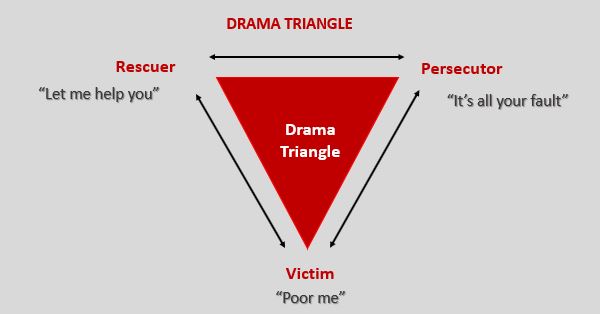No matter how successful or self-aware we are, most of us get caught in hidden relationship patterns that quietly drain our energy. They show up in boardrooms, family dinners, and even in the conversations we replay in our heads at night.
These patterns are subtle. They don’t announce themselves. Instead, they disguise themselves as “helping,” “defending,” or “keeping the peace.” But underneath, they leave us feeling resentful, exhausted, or misunderstood.
Psychologist Stephen Karpman called this dynamic the Drama Triangle, with three roles we unconsciously play:
- Victim – feeling powerless, stuck, or helpless.
- Rescuer – over-functioning, fixing, or saving others at the expense of ourselves.
- Persecutor – blaming, micromanaging, or reacting harshly.
I’ve seen this pattern in many of my clients:
- A senior executive who was constantly in Rescuer mode—taking on her team’s work, fixing problems herself, and burning out because she equated leadership with doing it all.
- A nonprofit leader who slipped into the Victim role, overwhelmed by donor demands and limited resources, convinced she had “no choice” but to sacrifice her health.
- A high-level manager who unintentionally fell into Persecutor mode, micromanaging under pressure, and later feeling guilty for her tone.
And yes—I’ve been there, too. Early in my corporate career, I slipped easily into the Rescuer role, trying to prove my worth by fixing everything. It seemed like a commitment, but inside, it was disconnection—from myself and from others.
Practical Ways to Step Out of Drama in the Moment
Here are small but powerful steps you can take when you notice you’re caught in the triangle:
- Pause & Breathe: Before reacting, take one deep breath. Slowing your nervous system is the first step to breaking the pattern.
- Name the Role: Say to yourself, “I’m in Rescuer right now,” or “I feel like a Victim in this moment.” Naming reduces shame and brings clarity.
- Ask a Power Question: Instead of acting automatically, ask:
- If you feel like a Victim: “What choices do I have right now?”
- If you feel like a Rescuer: “Am I helping, or am I over-functioning?”
- If you feel like a Persecutor: “What need of mine isn’t being met, and how can I ask for it clearly instead of lashing out?”
- Own Your Breakthrough: Say aloud (or journal): “I choose to break free. I can lead with clarity, not pressure. I can show up with love, not fear.”
Even these micro-shifts build awareness. And awareness is the first step toward transformation.
Reflection Prompt: When was the last time you noticed yourself rescuing, blaming, or feeling powerless? What’s one small step you can take to break free next time?
Tired of trying to figure out how to break free from The Drama Triangle? Reach out, take a Poer Pause, and explore your options. Book your time with Coach Clara Lucia HERE.
